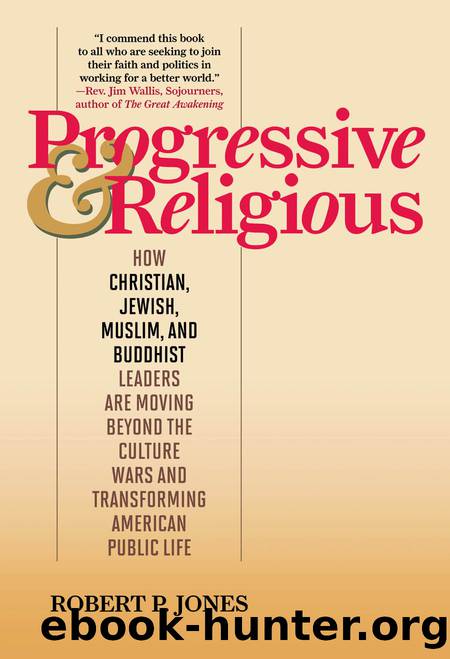Progressive & Religious by Jones Robert P.;

Author:Jones, Robert P.;
Language: eng
Format: epub
Publisher: Rowman & Littlefield Publishers
Published: 2008-08-15T00:00:00+00:00
Sacred Texts: Unity and Diversity in the Qurâan
Progressive Muslims bring a variety of tools to the encounter with the text of the Qurâan. They begin, as Abou El Fadl described, with what might be called an aesthetic approach to the tradition that links justice and beauty and privileges the fulfillment of divine beauty in the world as a criterion for discerning truth. This approach necessitates engaging in a creative conversation between contemporary experience and texts, a method that operates more in the realm of aesthetics than in the realm of deductive logic.
One of the clear characteristics of progressive Muslims that emerged in my interviews was the prominence of direct appeals to the Qurâan and the mystical Sufi tradition as a foundation for progressive stands and approaches. As Dr. Safi explained:
Progressives are extremely well-versed in and tend to go to two places as our security blanket. One may surprise people and the other one should not. The first one is the Qurâan, and the second is the example of Islamic mysticism or Sufism. Progressives in many ways are actually remarkably Qurâan-centric Muslims. And this might be a way in which progressive Muslims might be substantially different from progressive Christians or progressive Jews, in the extent to which they havenât ceded the Qurâan as a source of authority to literalist exclusivists.55
As Safi notes, the prominence of the Sufi mystical tradition is not so surprising, since the mystical approach is consistent with the progressive emphasis on creative interpretations of texts and the authority of direct, contemporary experience.56 However, the emphasis on direct appeals to the Qurâan at first glance may seem unusual. As many of the leaders I interviewed pointed out, however, this emphasis is understandable because, in addition to the Qurâan being the supreme authority that virtually all Muslims accept, the Qurâanic texts are often more open to progressive interpretation than the writings of Muslim jurists, especially conservative Muslim jurists who wrote from a defensive posture in the context of Western colonialism over the last few hundred years.57
When I asked progressive Muslim leaders for specific Qurâanic texts that grounded their own work, they most frequently cited passages that emphasized the unity and equality of all people and the goodness of diversity. Dr. Najir Khaja, a practicing physician and chairman of Islamic Information Services, a nonprofit media company reaching 2.5 million people in two hundred U.S. cities and seven countries through its flagship program, âThe American Muslim Hour,â paraphrased two passages from the Qurâan that I heard repeated numerous times during the interviews.
There is a passage in the Qurâan that starts, âwe have made you from a single soul,â so the gender issue is addressed there by a sense of equality. Then there is another passage that says, âMankind, we have made you into nations and tribes, so that you understand the differences between one another.â58
The tension between unity and diversity, from this perspective, is built into the very fabric of creation. On the one hand, all of humanity is descended not only
Download
This site does not store any files on its server. We only index and link to content provided by other sites. Please contact the content providers to delete copyright contents if any and email us, we'll remove relevant links or contents immediately.
| Africa | Americas |
| Arctic & Antarctica | Asia |
| Australia & Oceania | Europe |
| Middle East | Russia |
| United States | World |
| Ancient Civilizations | Military |
| Historical Study & Educational Resources |
Cecilia; Or, Memoirs of an Heiress — Volume 1 by Fanny Burney(32527)
Cecilia; Or, Memoirs of an Heiress — Volume 2 by Fanny Burney(31928)
Cecilia; Or, Memoirs of an Heiress — Volume 3 by Fanny Burney(31914)
The Secret History by Donna Tartt(18994)
Sapiens: A Brief History of Humankind by Yuval Noah Harari(14343)
Leonardo da Vinci by Walter Isaacson(13287)
The Radium Girls by Kate Moore(12001)
Sapiens by Yuval Noah Harari(5343)
How Democracies Die by Steven Levitsky & Daniel Ziblatt(5198)
The Wind in My Hair by Masih Alinejad(5069)
Homo Deus: A Brief History of Tomorrow by Yuval Noah Harari(4888)
Endurance: Shackleton's Incredible Voyage by Alfred Lansing(4742)
Man's Search for Meaning by Viktor Frankl(4553)
The Silk Roads by Peter Frankopan(4506)
Millionaire: The Philanderer, Gambler, and Duelist Who Invented Modern Finance by Janet Gleeson(4442)
The Rape of Nanking by Iris Chang(4188)
Joan of Arc by Mary Gordon(4076)
The Motorcycle Diaries by Ernesto Che Guevara(4069)
Stalin by Stephen Kotkin(3937)
